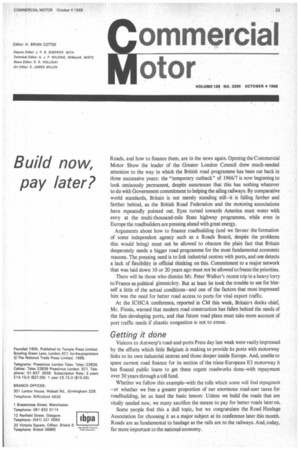Build now, pay later?
Page 25

If you've noticed an error in this article please click here to report it so we can fix it.
Roads, and how to finance them, are in the news again. Opening the Commercial Motor Show the leader of the Greater London Council drew much-needed attention to the way in which the British road programme has been cut back in three successive years: the "temporary cutback" of 1966/7 is now beginning to look ominously permanent, despite assurances that this has nothing whatever to do with Government commitment to helping the ailing railways. By comparative world standards, Britain is not merely standing still—it is falling farther and farther behind, as the British Road Federation and the motoring associations have repeatedly pointed out. Eyes turned towards America must water with envy at the multi-thousand-mile State highway programme, while even in Europe the roadbuiiders are pressing ahead with great energy.
Arguments about how to finance roadbuilding (and we favour the formation of some independent agency such as a Roads Board, despite the problems this would bring) must not be allowed to obscure the plain fact that Britain desperately needs a bigger road programme for the most fundamental economic reasons. The pressing need is to link industrial centres with ports, and one detects a lack of flexibility in official thinking on this. Commitment to a major network that was laid down 10 or 20 years ago must not be allowed to freeze the priorities.
There will be those who dismiss Mr. Peter Walker's recent trip in a heavy lorry to France as political gimmickry. But at least he took the trouble to see for himself a little of the actual conditions—and one of the factors that most impressed him was the need for better road access to ports for vital export traffic.
At the 1CHCA conference, reported in CM this week, Britain's docks chief, Mr. Finnis, warned that modern road construction has fallen behind the needs of the fast-developing ports, and that future road plans roust take more account of port traffic needs if chaotic congestion is not to ensue.
Getting It done
Visitors to Antwerp's road-and-ports Press day last week were vastly impressed by the efforts which little Belgium is making to provide its ports with motorway links to its own industrial centres and those deeper inside Europe. And, unable to spare current road finance for its section of the trans-European E3 motorway it has floated public loans to get these urgent roadworks done—with repayment over 30 years through a toll fund.
Whether we follow this example—with the tolls which some will find repugnant —or whether we free a greater proportion of our enormous road-user taxes for roadbuilding, let us heed the basic lesson: Unless we build the roads that are vitally needed now, we many sacrifice the means to pay for better roads later on.
Some people find this a dull topic, but we congratulate the Road Haulage Association for choosing it as a major subject at its conference later this month. Roads are as fundamental to haulage as the rails are to the railways. And, today, far more important to the national economy.












































































































